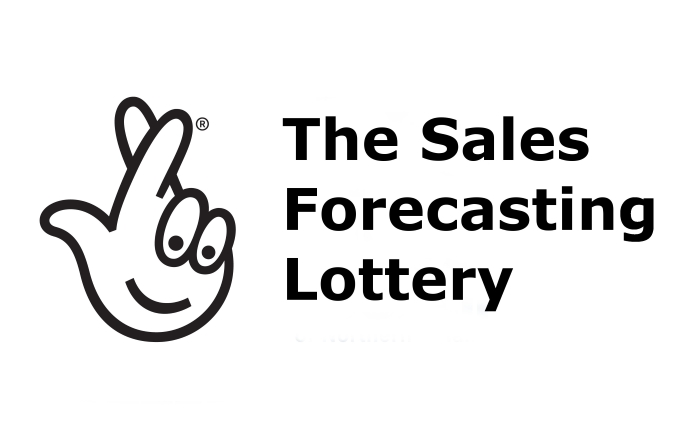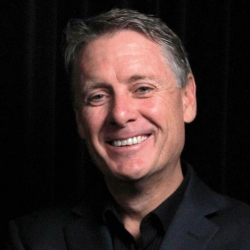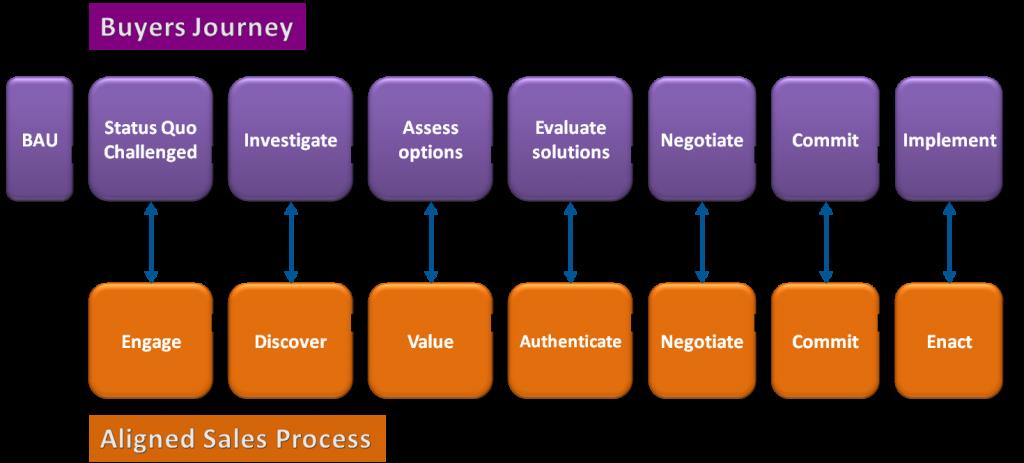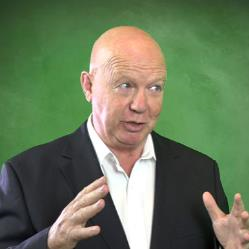
"Forecasting! The greatest cause of chagrin for most sales leaders and CEO's" - A discussion by John Smibert.
In sales what is the internal discussion topic you most dislike? I bet it's forecasting!

Whether you're a salesperson, a sales leader or a CEO or CFO you are likely to be frustrated with how often a forecast is missed resulting in negative impact throughout the organisation.
As a sales manager if was my biggest embarrassment when I missed a forecast.
So I decided to ask sales strategy guru Tony Hughes what he recommended to help us improve our forecasting accuracy.
I loved the resulting discussion from which I learnt a lot and I am sure you will too.
I particularly learnt there are some great ways to improve your forecasting while at the same time driving better sales results.
See the full interview below to learn how.
************
Tony is a leading author and keynote speaker in the world of B2B sales and sales leadership. He is well known for his strategic selling book "The Joshua Principle" and for the RSVPselling methodology.
See more of the 'TALKING SALES' series here
Interview
John: Hey Strategic Selling Group, welcome back, all the members - I've got Tony Hughes with me again!
Tony: Hey, John! How are you?
John: I'm great, Tony, and I'm really looking forward to this discussion. Every sales manager I talk with out there, and this is really aimed at the sales managers, most of them are really frustrated they can't nail their forecast. It's just an ongoing monthly and quarterly headache to get their forecast nailed down, they've got the pressure from management coming, they're putting the pressure on their people, and they still don't get it. I know you've written some really good articles recently about that. Let's talk on that subject.
Tony: Well, it's not just sales managers, John, it's the CEO of most businesses and the CFO, because they often look at the sales organisation, quite frustrated in that there's this black box mystery machine that sort of spits out numbers. Now, if you're in a high-volume, transactional commodity style of business, revenue forecasting is more predictable because history is a large determinant on what's going to happen in the future. But if you're in complex solution selling of enterprises, there's a lot of variables, and people's forecasts have big deals in it that actually make the whole revenue forecasting issue quite lumpy.

John: A big deal slips one month and it screws up your whole quarter.
Tony: It does, and the thing I think most of us know is that when deals slip the probability of that deal going away altogether dramatically increases, so time definitely kills deals. So, my view is if we look at forecasting there's a few things that are really important. You need a level of transparency, most people implement CRM systems as a pipeline reporting tool that people use to manage up and a contacts database, rather than implementing CRM to be sales force automation to automate the sales process.
John: And assist the salespeople to do a better job.
Tony: Correct, correct.
John: Because unless they see it as a tool that is going to help them, they're not going to support it.
Tony: That's very true. So every organisation needs to think first about buyer's journey and then how do we map to buyer's journey, and we then in doing that think about deal stages, and then we think about how do we support the buyer and the salesperson every stage in the process. If that's done within a CRM or sales force automation tool, then you're getting transparency, you're in essence playbooking the sales process and having transparency about where a deal's at.

The other thing I want to talk about is when you look at forecasting, often these systems will spit out reports and people tend to not trust the report, so there's some critical information that people need to include.
You need the obvious things - the name of the account, the opportunity, the value, the close date - but there's other things that are really essential. The first is you need to have deal stage in those reports, you then need to have on top of that deal probability, and I really use the qualification process to determine deal probability. So those basic things of do we have access to the right relationships, have we identified a strong business case for them implementing our solution...
John: You have the subject of probability versus in or out, particularly when you get into big deals, one big deal can influence a forecast for a region or a country quite significantly. Percentage really doesn't help, because if the deal's in, you blow your numbers and your numbers go way over your forecast; if the deal's out, you go way under.
Tony: Yes. That's the problem with a weighted pipeline or a weighted forecast where you simply have a look at the overall value of it and then the deal stages or the probabilities and then come up with a number, because a lot of these larger deals actually make the whole issue of hitting your numbers quite binary. So the thing you've got to have in there is what's the deal stage, what's the probability based on progressive qualifications. Qualification should not be a once-only event, it's a regular review. Sales managers need to coach their people in having their reviews, rather than pull out their blowtorch and ask the same inane questions of, "When is it coming in?"
John: "How big is it? When is it coming in?" what salespeople hate hearing, right?
Tony: [laughs] That adds no value for them at all and doesn't manage the risk in a deal. So, you need those two things. The other thing that you need to measure is really how long has it been in stages. For example, there's a gentleman I work closely with in the USA called Michael Bonner who's got a plugin for the Salesforce CRM system, but his system measures how long has it been in each stage for example, when was the deal last updated, so you get this concept of proof of life is how his particular product works. Then the other thing you need is next steps and status of the deal, and the mistake that most salespeople make when they update their next steps is it's too passive. We shouldn't be waiting, we shouldn't be hoping, we shouldn't be praying; the thing is, we need to know what's going on on the customer's side of the equation for them to progress this.
John: What's going on on the customer side is really important, isn't it, because that's where it happens, it doesn't happen on our side.
Tony: Yes.
John: You earlier raised the subject of the buying journey or the buying process and making sure we're mapping to that. Are you saying there's really only one process we're monitoring, or is it two processes, our sales process, our buyer process and getting them to align somehow?
Tony: You've hit something right on the head there. We need to create alignment, and I recommend people do that through creating a win plan - a close plan, a project plan, whatever you want to call it - with the client, but you sit down with your coach or your supporter inside the buying organisation and you basically have the conversation that says, "I want to make sure that we've got our resources available for when you need them in your buying process. I've built a bit of a project plan here from where we are today through to you being implemented and live, successfully using what we've talked about. Are these the things that need to happen inside your own organisation?"
John: And in my experience, customers are very happy to talk about that, they understand the need to be aligned so that you are able to respond to them when they have the need. Too often we don't ask that question, and it's a really, really good question to ask of our customer.
Tony: That's true, yes. And the thing if we do that well is what happens in that project plan or that close plan... We don't call it a close plan with the client, but what happens is...
John: A commitment plan.
Tony: Yes, and what actually happens is you get a natural date that's come from the customer about when they need to make that commitment to you as an organisation to sign the contract or place that purchase order.

John: And let's both commit to work to that date, and let's not have sales management saying, "Hey, we need to bring that forward a month or two." That can then screw up the whole relationship with the customer.
Tony: Yes. And I really just want to finish with a phrase that I think every salesperson should really get into their whole vocabulary when they're going and selling, and that is they need to ask the buyer, "What's your timing and process for being able to go ahead with this?" Keep asking that open question, "What's your timing and your process for you to be able to go ahead with this?" so you can understand.
John: And a month later, is the timing and the process still the same, has anything changed? You need to monitor that as part of the qualification process.
Tony: Correct, and what it does is it uncovers a close date that you, the seller, can confidently put into your CRM system, that's based on what the customer is wanting to have happen, not based on our end-of-month or end-of-quarter pressures.
John: And from a cultural point of view I hate that word "close", I'd much rather use a commitment date, the date we're both going to commit to each other.
Tony: Yes, that's right. And closing should be a logical next step in the process, not a white-knuckle, rollercoaster adventure where we're eventually hoping that we're going to get a positive answer.
John: I love it, Tony, there's some really good content there! We've gone a long time and I hope the audience stuck with us, but I think it was worth going through that level of detail.
Tony: Thanks, John!
John: Thanks, Tony!
****************
More interviews with Tony Hughes:
***************

Your Invitation: I invite you to join the Sales Leader Forum group on LinkedIn where you can experience informative discussions with your peers and sales thought leaders on subjects like the one we have discussed here. I also invite you to subscribe to the
- Sales Leader Resource Centre here
- Sales Leader YouTube channel here (300+ sales leadership videos)
Please Share: If you valued this article, please share via your Twitter, LinkedIn, Google+ and Facebook social media platforms. I encourage you to join the conversation or ask questions. So feel free to add a comment on this post - I promise to respond. If inclined please follow my LinkedIn post page here.
Want to touch base? If you have questions please feel free to contact me - email: john.smibert(at)salesleaderforums.com, Phone: +61 404857893 or Skype: john.smibert